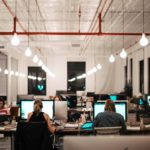 As hybrid working has become more commonplace, there has been an understandable focus given to what kind of working environment could tempt people back to the office. Research from the University of Arizona highlights that the ideal office space isn’t a one-size-fits-all proposition and that the personality of each employee is crucial to determining the best kind of environment.
As hybrid working has become more commonplace, there has been an understandable focus given to what kind of working environment could tempt people back to the office. Research from the University of Arizona highlights that the ideal office space isn’t a one-size-fits-all proposition and that the personality of each employee is crucial to determining the best kind of environment.
The researchers discovered that extroverted employees are usually happier when they’re working in a more open plan environment, with such an environment also making them more focused. For more introverted employees, however, the reverse is the case, with their best results coming when they work in private offices, where they can focus more on the tasks at hand.
Personality matters
“This suggests that the workspace should be designed to fit the worker, and not the other way around,” the researchers explain. “Our work illuminates the importance of considering both the individual’s personality and their environment in predicting important behavioral and mood outcomes, such as how happy a person is and how well a person is able to work.”
The investigation relied on information gathered from the Wellbuilt for Wellbeing research initiative. Over 270 federal office staff were equipped with health monitoring sensors and prompted via their smartphones to report on their current emotional state.
The researchers established correlations between multiple dimensions of staff well-being, such as physical activity, stress levels, sleep quality, conduct, concentration, and mood, and various features of their working environment, including the type of workstation they occupied.
Diverse workspaces
Typically, the allocation of diverse workspaces to staff members disregards their personal inclinations and optimal working conditions.
“As personality psychologists, we know that people are very different, and that they need different things to be well and do well,” the researchers explain. “At the same time, as it is estimated that we spend up to 90% of our time indoors, much of it in the workplace, it is imperative that those spaces fit individual needs. Yet, historically, organizations have treated all people as being and needing the same space—a one-size-fits-all model.”
Despite the fact that the research data was gathered prior to the pandemic, the issue of office design has gained greater importance in light of the “great resignation” phenomenon, which saw numerous employees quit their jobs following the COVID-19 outbreak. The trend towards greater diversity and adaptability in work environments is likely to be a permanent one, and it is now up to researchers to explore it further.
“In order to recruit and retain workers—their most valuable asset—organizations need to focus on the well-being of their workforce, front and center,” they conclude. “This study provides quantitative data for the importance of taking individual personality into account to optimize individual well-being in the workplace.”